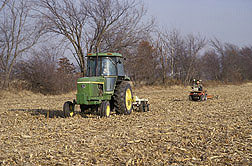 Researchers at USDA’s Agricultural Research Service Cropping Systems and Water Quality Research Unit in Columbia, Missouri are studying which combinations of precision agriculture methods work best.
Researchers at USDA’s Agricultural Research Service Cropping Systems and Water Quality Research Unit in Columbia, Missouri are studying which combinations of precision agriculture methods work best.
According to an article in the March 2007 issue of Agricultural Research magazine, researchers Newell Kitchen, Robert Lerch and Ken Sudduth are working to demonstrate how precision agriculture can be an economically viable tool for farmers.
The premise of precision agriculture systems is that farmers should tailor their management to fit specific areas of their farms instead of using a blanket treatment for everything. This means recognizing areas that have productivity and environmental problems and selecting the best solution for each one. The outcome is a system that increases profitability and conserves environmental resources.
Plenty of scientists are investigating the benefits of precision agriculture, but only a few are using an integrated approach, says soil scientist Newell Kitchen.
“Many scientists look at one variable, whereas we examine the interaction of many variables. We’re evaluating the system’s effects on production, profitability, and environment,” he says. This approach lets them assess, modify, and evaluate the effectiveness of integrated precision agriculture management practices.
Lots of great information in this article and more to come!
